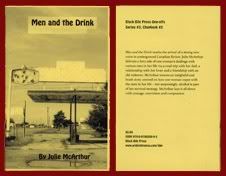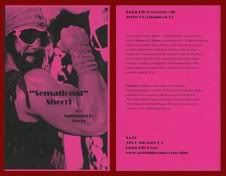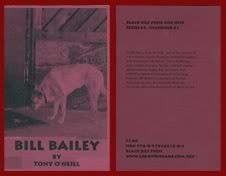
Sunday, January 30, 2011
To the Dogs by Thea Bowering
To the Dogs by Thea Bowering
published in an edition of 100 copies, 2010
privately printed, 52pp, price unknown
Thea Bowering has worked in Edmonton as a bartender, freelance writer, and Film Studies and Creative Writing instructor. Her fiction involves a female flâneur - one who wanders through the streets and avenues, evoking the history of a place, past and present, visiting its bookshops and boutiques, monuments; providing gossip and background to each, all the while looking through blank walls and past mundane edifices glimpsing the human dramas behind and beneath. It is to the conflicting backdrop of Alberta's Oil Sector and Edmonton's University culture that Bowering has set her postrealist novelette, To the Dogs.
Bowering's narrative circles around the female protagonist, narrator, bartender and flâneur, Riel (after Louis Riel) and the romantic love triangle she finds herself a part of with the emotional and psychological grifter and conman, Billy, and the quintessential other woman: Jasmine. In her search for meaning and love, Riel wrestles with concepts of truth and self knowledge throughout To the Dogs, evoking "a hell of the mind" in as much as the possibility of the existence of any potential future:
I found To the Dogs very much reminiscent of Juan Butler's Cabbagetown Diary: A Documentary in the manner in which it described and documented the gentrification of Whyte Avenue (82nd Avenue) in Edmonton's Old Strathcona district during the mid to late 1990s, as well as Louis Rastelli's A Fine Ending.
Indeed, some might be put off by the otherwise unusually dark themes which abound in Bowering's work:
And that is it. A superb novelette. I only hope that Thea Bowering decides to produce more copies of this dark little gem which delivers on every promise it makes.
********************************************************************************************************************************
Thea Bowering is currently working on a collection of short fiction that explores themes and forms of contemporary flânerie. Her fiction has appeared in The Capilano Review, Dandelion, TESSERA, and Matrix.
published in an edition of 100 copies, 2010
privately printed, 52pp, price unknown
Thea Bowering has worked in Edmonton as a bartender, freelance writer, and Film Studies and Creative Writing instructor. Her fiction involves a female flâneur - one who wanders through the streets and avenues, evoking the history of a place, past and present, visiting its bookshops and boutiques, monuments; providing gossip and background to each, all the while looking through blank walls and past mundane edifices glimpsing the human dramas behind and beneath. It is to the conflicting backdrop of Alberta's Oil Sector and Edmonton's University culture that Bowering has set her postrealist novelette, To the Dogs.
Bowering's narrative circles around the female protagonist, narrator, bartender and flâneur, Riel (after Louis Riel) and the romantic love triangle she finds herself a part of with the emotional and psychological grifter and conman, Billy, and the quintessential other woman: Jasmine. In her search for meaning and love, Riel wrestles with concepts of truth and self knowledge throughout To the Dogs, evoking "a hell of the mind" in as much as the possibility of the existence of any potential future:
After living with The Poor, he [Orwell] concluded that: the great redeeming feature of poverty is that it annihilates the future.
That was it. This was the key to Billy and Jasmine's world that I couldn't go down into. Somehow Billy and Jasmine had escaped tragedy by staying in the middle of it. They could stand anything. For them, happiness was merely a series of moral lessons missed. Jasmine would forever continue her theatrics in front of her camera, and her eyes would shine with the excitement of love renewed, over and over again; and Billy, he would continue to operate and rot under the guise of union. In the ongoing present there are no sins, only actions, and nobody dies from them. Well, if they do, it's only another action. Something for all those oil professionals, with their 50 thousand dollar trucks, to run over and obliterate. (To the Dogs, p.44)
I found To the Dogs very much reminiscent of Juan Butler's Cabbagetown Diary: A Documentary in the manner in which it described and documented the gentrification of Whyte Avenue (82nd Avenue) in Edmonton's Old Strathcona district during the mid to late 1990s, as well as Louis Rastelli's A Fine Ending.
Indeed, some might be put off by the otherwise unusually dark themes which abound in Bowering's work:
I try to imagine what would happen to someone like Billy, who, now I can see, is like so many on the Avenue. Does he just go on forever like this? No disaster, just one meager pay period to the next. One crappy apartment half furnished. A new pair of boots every 4 years or so. Until he's lived a lifetime more or less -- then, at around 50 or so, still working in a kitchen, some infection in the lung takes him one day. Perhaps there is a memorial at his last bar or restaurant and that is it. (To the Dogs, p.46)
And that is it. A superb novelette. I only hope that Thea Bowering decides to produce more copies of this dark little gem which delivers on every promise it makes.
********************************************************************************************************************************
Thea Bowering is currently working on a collection of short fiction that explores themes and forms of contemporary flânerie. Her fiction has appeared in The Capilano Review, Dandelion, TESSERA, and Matrix.
2 Comments:
 Men and the Drink
Men and the Drink "Sensational" Sherri
"Sensational" Sherri Bill Bailey
Bill Bailey
It is self-gratification to write and self-publish a book that chronicles and details a one-sided perspective of an interpersonal situation. Yes, do this to your heart's content if you will not identify the people involved, or, like a good fiction writer, flesh out the characters and find their motivations and make them real. This is all moot if there is a real person for reference.
It seems like Thea wants to simply gush out her version of a love triangle. She may feel stifled, jilted, or wronged, but, honestly, a book is no forum for that. Grow up, treat your characters properly, and do not slander others.